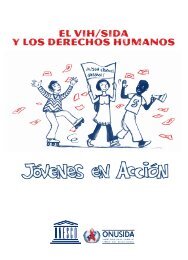the united republic of tanzania health sector hiv and aids strategic plan
the united republic of tanzania health sector hiv and aids strategic plan
the united republic of tanzania health sector hiv and aids strategic plan
Create successful ePaper yourself
Turn your PDF publications into a flip-book with our unique Google optimized e-Paper software.
Indicator<br />
% <strong>of</strong> blood units transfused that have been screened for HIV, syphilis <strong>and</strong> hepatitis according to<br />
National guidelines<br />
Key implementers<br />
MoHSW, Private hospitals, RHMTs, CHMTs<br />
B. Workplace interventions for HCW<br />
Preamble<br />
HCWs may acquire infection at places <strong>of</strong> work as an occupational risk or through sexual networking. In<br />
<strong>health</strong> care settings, universal bio-safety precautions <strong>and</strong> safe waste management is essential for<br />
prevention <strong>of</strong> nosocomial transmission <strong>of</strong> infectious agents.<br />
Situation analysis<br />
Achievements<br />
a) Universal precautions <strong>and</strong> medical waste management<br />
Guidelines for national hospital waste management have been developed <strong>and</strong> are being<br />
observed in most <strong>health</strong> facilities in <strong>the</strong> country.<br />
Facilities have ways <strong>of</strong> disposing waste such as incinerators <strong>and</strong> pits.<br />
There are satisfactory initiatives to intensify advocacy <strong>and</strong> sensitize <strong>health</strong> workers on issues<br />
related to HIV transmission risks at <strong>the</strong> workplace.<br />
b) Safe injections<br />
Safe disposal <strong>of</strong> needles <strong>and</strong> sharps is practiced in <strong>health</strong> facilities in special boxes or<br />
improvised alternatives.<br />
HCW are trained on <strong>the</strong> need to avoid recapping <strong>of</strong> syringes as part <strong>of</strong> <strong>the</strong> Infection<br />
Prevention Programme <strong>of</strong> <strong>the</strong> MOHSW<br />
c) Workplace interventions for HCWs<br />
The Occupational Unit <strong>of</strong> <strong>the</strong> MOHSW has developed a <strong>strategic</strong> <strong>plan</strong> for <strong>the</strong> control <strong>of</strong> HIV<br />
<strong>and</strong> AIDS for HCW at <strong>the</strong> workplace for <strong>the</strong> period 2006-2011.<br />
MOHSW developed National Infection Prevention <strong>and</strong> Control (IPC) Guidelines for <strong>health</strong><br />
care services in Tanzania in 2004.<br />
Training <strong>of</strong> <strong>health</strong>care providers has been done in <strong>the</strong> zonal hospitals.<br />
d) Post-exposure prophylaxis (PEP)<br />
Despite MoHSW guidelines on PEP so far only facilities with Care <strong>and</strong> Treatment Clinics<br />
have PEP kits for needle stick injuries.<br />
Challenges<br />
Aspects Challenges for Workplace Interventions for HCW<br />
Availability • Limited awareness about risks <strong>of</strong> HIV transmission in hospital settings<br />
• Low rate <strong>of</strong> implementation <strong>of</strong> PEP.<br />
• Inadequate coverage <strong>of</strong> HIV work place interventions in <strong>health</strong> facilities<br />
Equitable<br />
• Inadequate knowledge <strong>and</strong> skills among <strong>health</strong>care providers on IPC.<br />
access<br />
Quality • Inadequate functioning <strong>of</strong> National Quality Improvement Committee (NQIC)<br />
on infection control<br />
• Lack <strong>of</strong> harmonized training materials on Infection IPC<br />
• No coordination forum for IPC<br />
29 |FINAL COMBINED-HSHSP 2008-2012: June 24 th 2007










